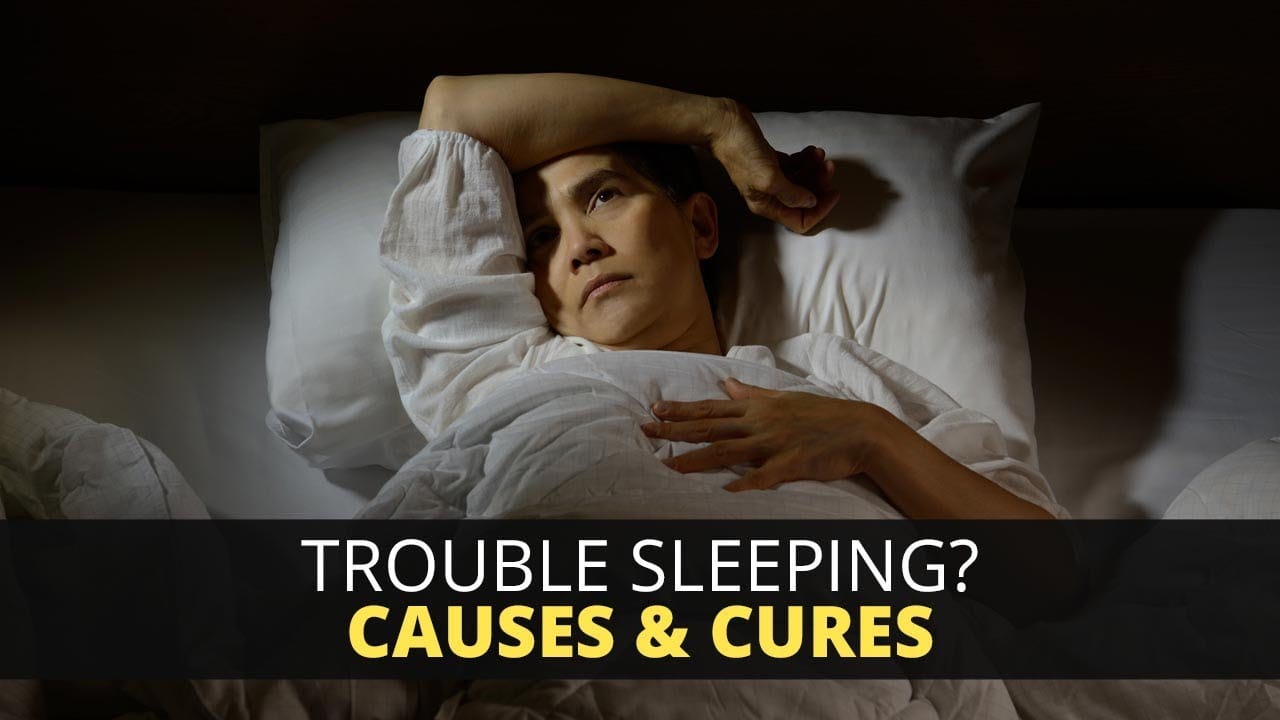
Video summarized in article below
Dr. Carrie: Trouble sleeping. This is a very big issue for a lot of people. A lot of important functions actually happen during sleep. So, we want to make sure that you have a very good night’s sleep.
Not being able to sleep can really put a damper on any healing process.
There are two different types of trouble sleeping: trouble going to sleep or trouble staying asleep. So, we’re going to go through some of the common reasons for trouble going to sleep. Dr. Jeremy?
Dr. Jeremy: The first reason is that you might have an elevated cortisol level at night. Cortisol is your body’s main antistress hormone. With higher levels of cortisol, your melatonin—which is your sleep hormone—can be negatively affected. So then, this might make it difficult for you to fall asleep.
You can find out if you have elevated cortisol at night by doing some saliva lab testing to see how your cortisol curve is and to see if it is elevated at night.
What’s the second reason, Dr. Lam, about why people have trouble going to sleep?
Dr. Carrie: People might have excess adrenaline or epinephrine and norepinephrine. Epinephrine and norepinephrine are your “fight or flight” hormones. So, when you have a lot of this going on, you can imagine how hard it is to really calm down to go to sleep well.
These two neurotransmitters are major players in The Neuroaffect circuit of the NeuroEndoMetabolic stress response.
Dr. Michael: This being wired during the day and tired, but unable to fall asleep, is classic of adrenal fatigue when the sympathetic system is tied into adrenaline. At the same time, it flows into the sleep cycle, so it basically affects both circuits and is very troublesome. Not only that, but when you get so tired, eventually you will fall asleep, but you will never sleep well because two or three hours later, you will wake up.
Why would that be so?
Dr. Carrie: Sometimes when you wake up in the middle of the night, it could be due to an imbalanced type of blood sugar. Blood sugar imbalance is a common symptom that we see in adrenal fatigue. This usually affects people even during the daytime when they feel like they have to snack every two to three hours. They get really hangry if they don’t eat, or they feel their blood sugar kind of going low and they feel unwell. Not saying that their blood sugar actually is low, it’s just that feeling of shakiness when they don’t eat.
This could be due to a congested liver, a lowered function of the pancreas, or some insulin production or receptor issues, or dietary choices if you eat a lot of carbs or processed carbs and refined sugars. It could release back your insulin really quickly and make you hungry faster. So, there could be a lot of reasons why your sugar is imbalanced.
Dr. Michael: Yes, and we have to be very careful because we don’t want to jump to the conclusion that you have diabetes or hypoglycemia, because if you actually measure the blood sugar itself during these ill-feeling periods, it is actually normal. So the body’s reacting somewhat hypersensitively even to normal ranges of blood sugar. This is very troublesome for many people. They just don’t feel good even though labs are normal.
Dr. Jeremy: Here are some tips that are going to help you try to sleep better.
To deal with that elevated cortisol, some supplements such as magnesium, taking GABA or phosphorylated serine might actually help with the elevated cortisol and might help you with your sleep.
Dr. Carrie: If you have an elevated adrenaline/epinephrine response, doing the adrenal breathing can help to bring down that sympathetic response. Trying some other types of sleep aides and adrenal yoga to reset that mind-body connection could also be helpful for helping you go to sleep.
Dr. Michael: One of the things I have to caution about, that Dr. Jeremy mentioned, is that a lot of these compounds even like phosphorylated serine, magnesium, theanine, and GABA, they work only a certain percent of the time. If your body’s already very weak and it’s fragile and really nervous, they can behave paradoxically. So, we see a lot of people come to us for overuse of these compounds. They just read about it on the internet. They buy it themselves, or the practitioner says with their best intentions to try to do that, and then actually they get worse.
I’m not saying these things are not good. I think you have to understand that without proper individualization, what’s supposed to help actually can make you worse. So, just be aware, especially if you are in the advanced stages.
Dr. Jeremy: So, also to help with the imbalanced blood sugar, taking snacks in the evening is helpful. We like recommending nuts or almond milk, because it kind of stays in your digestive system longer and gives you good nutrients throughout the day and throughout the evening. Intaking a lot of protein is also good for an energy source, and then imbalanced blood sugar can be dealt with. Chromium and berberine as well, but again, these supplementations need to be taken with caution and with an individualized approach.
© Copyright 2020 Michael Lam, M.D. All Rights Reserved.
